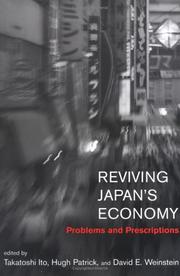| Listing 1 - 10 of 17 | << page >> |
Sort by
|

ISBN: 0262090406 9780262090407 Year: 2005 Publisher: Cambridge, Mass.: MIT Press,
Abstract | Keywords | Export | Availability | Bookmark
 Loading...
Loading...Choose an application
- Reference Manager
- EndNote
- RefWorks (Direct export to RefWorks)
Papers from a research project administered through the Center on Japanese Economy and Business, Columbia University, and the Research Center for Advanced Science and Techncology, University of Tokyo, and with revisions made after a closed March 2004 academic conference held in Tokyo

ISBN: 0472081551 0472101978 9780472101979 Year: 1991 Publisher: Ann Arbor (Mich.): University of Michigan press,
Abstract | Keywords | Export | Availability | Bookmark
 Loading...
Loading...Choose an application
- Reference Manager
- EndNote
- RefWorks (Direct export to RefWorks)
Japan --- Japon --- Economic conditions --- Economic policy --- Conditions économiques --- Politique économique --- Conditions économiques --- Politique économique --- Japan - Economic conditions - 1989 --- -Japan - Economic policy - 1989 --- -Japan

ISBN: 1280356367 9786610356362 926400890X 9264008888 9789264008908 Year: 2005 Publisher: Paris : Organisation for Economic Co-operation and Development,
Abstract | Keywords | Export | Availability | Bookmark
 Loading...
Loading...Choose an application
- Reference Manager
- EndNote
- RefWorks (Direct export to RefWorks)
Low growth, population ageing and depopulation, and new trade relationships with the East Asia region have made it increasingly necessary for Japan to reform its economic and institutional systems. A key element of this reform concerns Japan's policies for regional development. This report reviews progress with different aspects of this reform, such as reform of territorial planning, regional economic policy, urban policy, rural development and administrative and fiscal decentralisation. It highlights the challenge facing the Japanese government as it combines new approaches to policy-making at the central level with mechanisms that assign a greater voice to regional and local actors.
Book
ISBN: 1857880579 Year: 1994 Publisher: London Nicholas Brealey Publishing
Abstract | Keywords | Export | Availability | Bookmark
 Loading...
Loading...Choose an application
- Reference Manager
- EndNote
- RefWorks (Direct export to RefWorks)
Droit international économique --- Droit économique (Droit international) --- Droit économique international --- Economic forecasting --- Economic policy [Foreign ] --- Economic relations [Foreign ] --- Economics [International ] --- Economische betrekkingen [Internationale ] --- Economische vooruitzichten --- Foreign economic policy --- Interdependence of nations --- International economic policy --- International economic relations --- International economics --- Internationale economische betrekkingen --- New international economic order --- Perspective économique --- Projection économique --- Prévision économique --- Prévisions économiques --- Relations économiques internationales --- ECONOMIC FORECASTING --- JAPAN--ECONOMIC POLICY --- EUROPE--ECONOMIC POLICY --- USA--ECONOMIC POLICY --- INTERNATIONAL ECONOMIC RELATIONS --- COMPETITION, INTERNATIONAL --- European Union countries --- Economic policy --- United States --- 1981-1993 --- Economic history --- 1990 --- -Japan --- 1989 --- -International economic relations --- Economic history - 1990 --- -Japan - Economic policy - 1989 --- -Economic forecasting --- -Japan - Economic policy - 1989-

ISBN: 0226060217 9786611125332 1281125334 0226060233 9780226060231 9780226060217 9781281125330 6611125337 Year: 2003 Publisher: Chicago : University of Chicago Press,
Abstract | Keywords | Export | Availability | Bookmark
 Loading...
Loading...Choose an application
- Reference Manager
- EndNote
- RefWorks (Direct export to RefWorks)
As Japan's decade-long economic stagnation continues, there has been much analysis of the immediate macroeconomic problems that confront the Japanese economy. This book looks past the short-run challenges to the future of Japan and highlights the intermediate and longer-term issues that country faces. In this, the first book-length academic treatment of this important issue, a team of notable contributors present nine papers, offering a comprehensive assessment of those economic difficulties and addressing a range of specific issues, from financial restructuring and the impact of the aging Japanese population to corporate behavior, public lending, employment practices, and innovative capacity. In each paper, contributors clearly identify and outline problems and concerns, carefully pose provocative questions, and in many instances present concrete suggestions for improvement. The resulting volume is a timely and important examination of critical issues for Japan's stalling economy, packed with both telling data and expert analysis and offering valuable perspectives on Japan's current obstacles.
Japan -- Economic conditions -- 1989-. --- Japan - Economic conditions - 1989-. --- Japan -- Economic conditions. --- Japan -- Economic policy -- 1989-. --- Japan - Economic policy - 1989-. --- Economic History --- Business & Economics --- Japan --- Economic conditions --- Economic policy --- Nihon --- Nippon --- Iapōnia --- Zhāpān --- I︠A︡ponii︠a︡ --- Yapan --- Japon --- Japão --- Japam --- Mư̄ang Yīpun --- Prathēt Yīpun --- Yīpun --- Jih-pen --- Riben --- Government of Japan --- Structural impediments --- Economic research --- NBER --- E-books --- Business. --- BUSINESS & ECONOMICS / General. --- Trade --- Economics --- Management --- Commerce --- Industrial management --- japan, economics, stagnation, economy, innovation, employment, labor, public lending, finance, banking, corporate behavior, aging, financial restructuring, workforce, nonfiction, policy, government, capitalism, business, capital, profitability, double-gearing, filp, cpi, retail density, regulation, distribution efficiency, investment, savings.

ISBN: 019927861X 9780199278619 9786611346249 1281346241 0191515531 142942186X 9780191515538 9781429421867 6611346244 Year: 2005 Publisher: Oxford Oxford University Press
Abstract | Keywords | Export | Availability | Bookmark
 Loading...
Loading...Choose an application
- Reference Manager
- EndNote
- RefWorks (Direct export to RefWorks)
Despite recent upheavals, Japan remains one of the dominant economic powers at the end of the twentieth century. Yet the Japanese economy is one of the most misunderstood phenomena in the modern world. Aimed at graduate courses on Japan, this book will be indispensable both for students and instructors alike. Lucid explanations and comprehensive and rigorous analysis make it a natural choice for any interested in comprehending the rise of the Japanese economy. - ;Despite recent upheavals, Japan remains one of the dominant economic powers. Yet the Japanese economy is one of the most misundersto
Economic conditions. Economic development --- Japan --- Japan -- Economic conditions -- 1989-. --- Japan -- Economic conditions. --- Japan -- Economic policy -- 1989-. --- Japan -- Economic policy. --- Economic History --- Business & Economics --- 330.952049 --- Economic conditions --- -Economic policy --- -330.952049 --- -Japan -- Economic conditions -- 1989-. --- -Economic conditions. Economic development --- Economic policy --- E-books
Book
ISBN: 9780521856720 9780511754333 9780521672726 9780511429873 0511429878 0511428332 9780511428333 0521856728 0521672724 0511754337 1107196302 1281791393 9786611791391 0511429495 0511427697 0511429045 Year: 2008 Publisher: Cambridge: Cambridge university press,
Abstract | Keywords | Export | Availability | Bookmark
 Loading...
Loading...Choose an application
- Reference Manager
- EndNote
- RefWorks (Direct export to RefWorks)
An analysis of the performance of Japan's economic and political institutions from late 1970s to 2007. The authors explain how Japan's flawed response to new economic, political, and technological forces ushered in a lost decade and a half of economic development from 1990. Impressive economic performance in the 1980s masked an 'accident waiting to happen' - the collapse in equity and real estate prices in 1990-1. Japan's iron triangle of politicians, bureaucrats, and client industries, combined with a flawed financial liberalization process and policy errors by the Bank of Japan and the Ministry of Finance, brought Japan to an abyss of deflation, recession, and insolvency by the late 1990s. The turning point was the election of Koizumi as prime minister in 2001. The book explores Koizumi's economic reform, new developments in socioeconomic conditions, the politics and economy after Koizumi, and the economic and political challenges facing Japan in the new century.
JP / Japan - Japon --- 92 --- 321.2 --- Geschiedenis. --- Histoire. --- History. --- 92 Geschiedenis. --- 92 Histoire. --- 92 History. --- Economisch beleid van de overheid. --- Japan --- Economic conditions --- Economic policy --- Economisch beleid van de overheid --- Geschiedenis --- Economics --- Business, Economy and Management --- Japan - Economic conditions - 1989 --- -Japan - Economic conditions - 1945-1989 --- Japan - Economic policy - 1989 --- -Japan

ISBN: 1501707353 1501707361 9781501707360 0801435323 9780801435324 0801485290 9780801485299 Year: 1998 Publisher: Ithaca: Cornell university press,
Abstract | Keywords | Export | Availability | Bookmark
 Loading...
Loading...Choose an application
- Reference Manager
- EndNote
- RefWorks (Direct export to RefWorks)
The Liberal Democratic Party, which dominated postwar Japan, lost power in the early 1990s. During that same period, Japan's once stellar economy suffered stagnation and collapse. Now a well-known commentator on contemporary Japan traces the political dynamics of the country to determine the reasons for these changes and the extent to which its political and economic systems have been permanently altered.T. J. Pempel contrasts the political economy of Japan during two decades: the 1960s, when the nation experienced conservative political dominance and high growth, and the early 1990s, when the "bubble economy" collapsed and electoral politics changed. The different dynamics of the two periods indicate a regime shift in which the present political economy deviates profoundly from earlier forms. This shift has involved a transformation in socioeconomic alliances, political and economic institutions, and public policy profile, rendering Japanese politics far less predictable than in the past. Pempel weighs the Japanese case against comparative data from the United States, Great Britain, Sweden, and Italy to show how unusual Japan's political economy had been in the 1960s.Regime Shift suggests that Japan's present troubles are deeply rooted in the economy's earlier success. It is a much-anticipated work that offers an original framework for understanding the critical changes that have affected political and economic institutions in Japan.
Economic history --- Japan --- Economic policy --- Economic conditions --- J4300.90 --- J4301 --- Japan: Economy and industry -- history -- postwar Shōwa (1945- ), Heisei period (1989- ), contemporary --- Japan: Economy and industry -- policy, legislation, guidelines, codes of behavior --- JP / Japan - Japon --- 331.31 --- Economisch beleid --- Economic history - 1945 --- -Japan - Economic conditions - 1945 --- -Japan - Economic policy - 1945-1989 --- Japan - Economic policy - 1989 --- -Economic history

ISBN: 0226532704 9786612537417 0226532720 1282537415 9780226532721 9780226532707 9781282537415 6612537418 Year: 2006 Publisher: Chicago, Ill. University of Chicago Press
Abstract | Keywords | Export | Availability | Bookmark
 Loading...
Loading...Choose an application
- Reference Manager
- EndNote
- RefWorks (Direct export to RefWorks)
For Western economists and journalists, the most distinctive facet of the post-war Japanese business world has been the keiretsu, or the insular business alliances among powerful corporations. Within keiretsu groups, argue these observers, firms preferentially trade, lend money, take and receive technical and financial assistance, and cement their ties through cross-shareholding agreements. In The Fable of the Keiretsu, Yoshiro Miwa and J. Mark Ramseyer demonstrate that all this talk is really just urban legend. In their insightful analysis, the authors show that the very idea of the keiretsu was created and propagated by Marxist scholars in post-war Japan. Western scholars merely repatriated the legend to show the culturally contingent nature of modern economic analysis. Laying waste to the notion of keiretsu, the authors debunk several related "facts" as well: that Japanese firms maintain special arrangements with a "main bank," that firms are systematically poorly managed, and that the Japanese government guided post-war growth. In demolishing these long-held assumptions, they offer one of the few reliable chronicles of the realities of Japanese business.
Economic order --- Japan --- J4411 --- Japan: Economy and industry -- industrial organization and relations -- conglomerates, zaibatsu, keiretsu --- Conglomerate corporations - Japan. --- Conglomerate corporations -- Japan. --- Corporations - Finance. --- Corporations -- Finance. --- Japan -- Economic conditions -- 1989-. --- Japan - Economic conditions - 1989-. --- Japan -- Economic policy -- 1989-. --- Japan - Economic policy - 1989-. --- Industrial Management --- Management --- Business & Economics --- Economic policy --- Economic conditions --- Conglomerate corporations --- Corporations --- Finance. --- Business finance --- Capitalization (Finance) --- Corporate finance --- Corporate financial management --- Corporation finance --- Financial analysis of corporations --- Financial management, Corporate --- Financial management of corporations --- Financial planning of corporations --- Managerial finance --- Going public (Securities) --- Finance --- E-books --- keiretsu, business, japan, economy, alliance, corporation, preference, trading, shareholding, lending, marxism, conglomerate, main bank, management, growth, economics, zaibatsu, outside directors, government, regulation, assistance, loyalty, honor, market, central planning, myth, urban legend, profit, industrial policy, networks.
Book
ISBN: 9781498516761 1498516769 Year: 2016 Publisher: Lanham: Lexington books,
Abstract | Keywords | Export | Availability | Bookmark
 Loading...
Loading...Choose an application
- Reference Manager
- EndNote
- RefWorks (Direct export to RefWorks)
"This book analyzes contemporary Japanese politics, charting the return of Prime Minister Shinzo Abe's domestic political dominance and his economic and foreign policy agenda. It is an up-to-date account and critique of the progress, obstacles, and far-reaching consequences of one of the most important periods in recent Japanese history"--Provided by publisher.
Prime ministers --- Abe, Shinzō, --- Political and social views. --- Influence. --- Japan --- Politics and government --- Economic policy --- Foreign relations --- J4600.90 --- Japan: Politics and law -- history -- postwar Shōwa (1945- ), Heisei period (1989- ), contemporary --- Political and social views --- Influence --- Prime ministers - Japan - Biography --- Abe, Shinzō, - 1954 --- -Abe, Shinzō, - 1954- - Political and social views --- Abe, Shinzō, - 1954- - Influence --- Japan - Politics and government - 1989 --- -Japan - Economic policy - 1989 --- -Japan - Foreign relations - 1989 --- -J4600.90 --- -Abe, Shinzō, - 1954 --- -Japan
| Listing 1 - 10 of 17 | << page >> |
Sort by
|

 Search
Search Feedback
Feedback About UniCat
About UniCat  Help
Help News
News